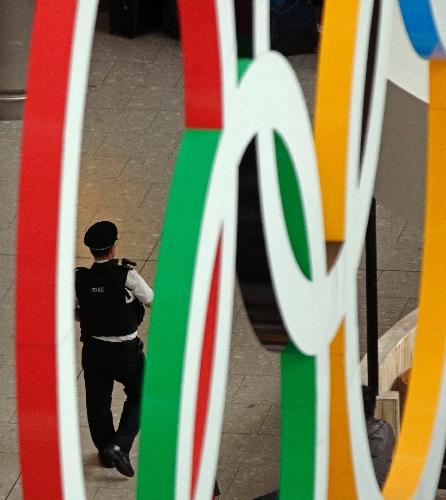London organizers defend preparation

LONDON – London Games officials dismissed concerns Tuesday over a lost bus driver, a scramble for more security guards and some rain-soaked venues – embarrassments that had one tabloid newspaper headline using the Olympic rings to spell out the word “OOPS!”
Organizers said some of the complaints were exaggerated and tried to put the best face on the unfolding security debacle, as well as other concerns about the games, which start in 10 days.
“Let’s put this in proportion,” London Olympics head Sebastian Coe told reporters. “This has not, nor will it, impact on the safety and security of these games. That, of course, is our No. 1 priority.”
His efforts were undercut in Parliament, where the chief executive of the G4S security group, Nick Buckles, acknowledged that his company’s failure to recruit enough Olympic staff had embarrassed the entire nation. Some 3,500 British troops – including some just back from Afghanistan – had to be called in on short notice to fill the gap. Thousands more military personnel had already been assigned to the games.
Buckles gave a groveling mea culpa on live TV as he was being questioned by angry lawmakers.
“It’s a humiliating shambles for the country, isn’t it?” Labour lawmaker David Winnick asked.
“I cannot disagree with you,” Buckles said.
He was hard-pressed to explain why his company had failed to tell officials until only two weeks before the start of the games that its recruitment efforts had failed.
Some U.S. security and law enforcement officials had privately expressed concerns as early as last year that there might not be enough personnel for the London Games.
The FBI is sending about two dozen agents to London to work on Olympic security, according to two U.S. government officials. They spoke on condition of anonymity because they were not authorized to talk publicly about the plans.
G4S will pay for its mistake, saying it expects to lose 35 million to 50 million pounds ($54 million to $78 million) on the contract, which is about 12 percent of its annual profit.
Olympics minister Hugh Robertson said the deployment of soldiers at Olympic Park would give people “enormous reassurance.”
Robertson, an army veteran, said athletes are “incredibly reassured to see the armed forces on the gate.”
About 2,500 of the additional personnel will be housed in East London at Tobacco Dock, a 19th century tobacco warehouse now used as an exhibition center, the military said.
Outside Parliament, hundreds of London cabbies ignited new traffic jams as they protested their exclusion from special Olympic lanes set up across the city’s roads for buses and cars carrying athletes and other VIPs.
As the world’s athletes flew into London on Monday – the first big day of Olympic arrivals – a few buses carrying them from Heathrow Airport took a wrong turn and got lost.
“OOPS!” headlined The Sun tabloid, using two of the interlocked Olympic rings in the word.
“First day. First arrivals. It’s going to happen,” said Jayne Pearce, head of press operations.
Still, the lost buses – one carrying Americans, the other Australians – touched a nerve. From the start, London organizers have feared repeating the transportation woes of the 1996 Atlanta Olympics, where one of the biggest problems was hiring bus drivers from outside the city who didn’t know their way around.
Coe urged optimism, despite a Twitter storm that erupted when U.S. hurdler Kerron Clement took to the social networking site to express frustration with what he said was a four-hour bus ride from Heathrow to the athletes village.
Coe said Clement’s journey actually took 2½ hours and most athletes experienced no problems in reaching the village.
“Apart from a misturning and a couple of tweets, we’re in pretty good shape,” Coe quipped. “The majority of athletes got in in good shape and on time. When they were met by our village mayor and chief executive, they were busily tweeting, saying how much they were enjoying village life. Ninety-eight percent of these journeys went without a hitch.”
At Heathrow itself, the airport sailed through its heaviest passenger day ever with short immigration lines and plenty of help for Olympic travelers.